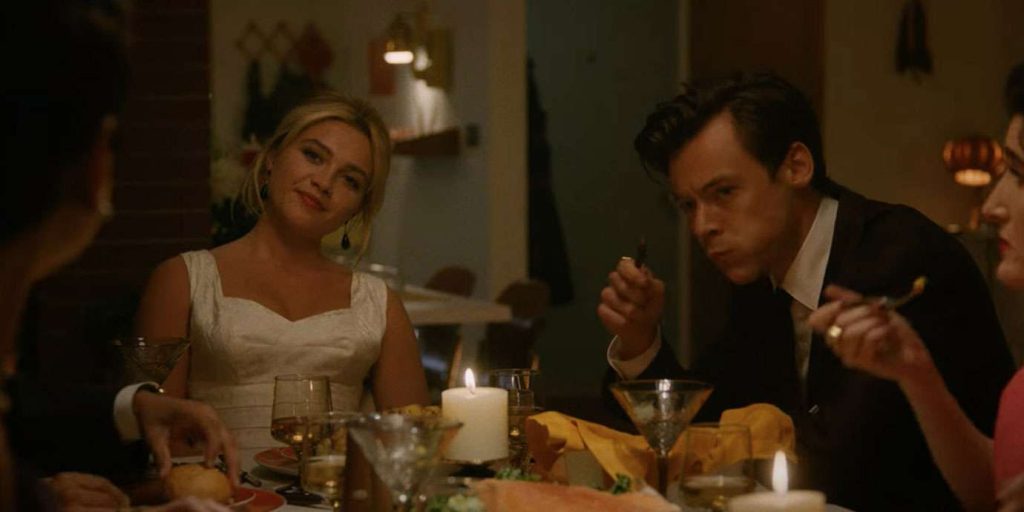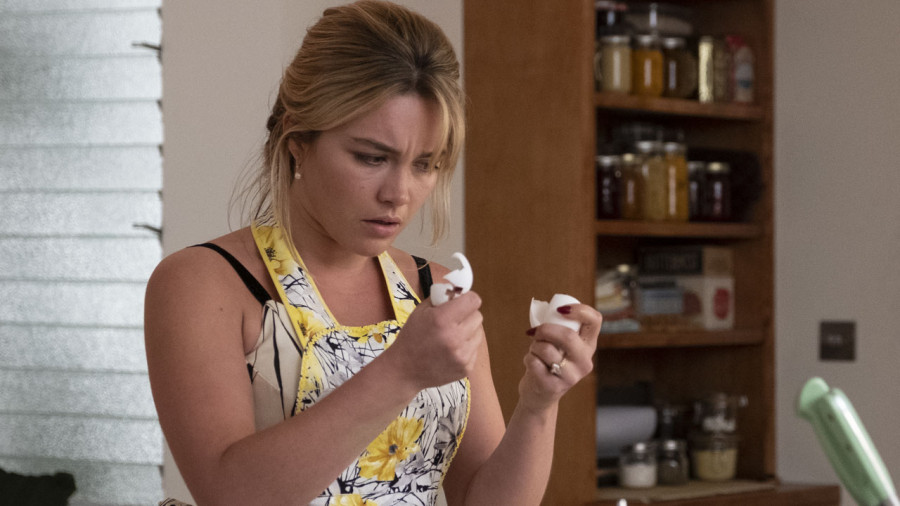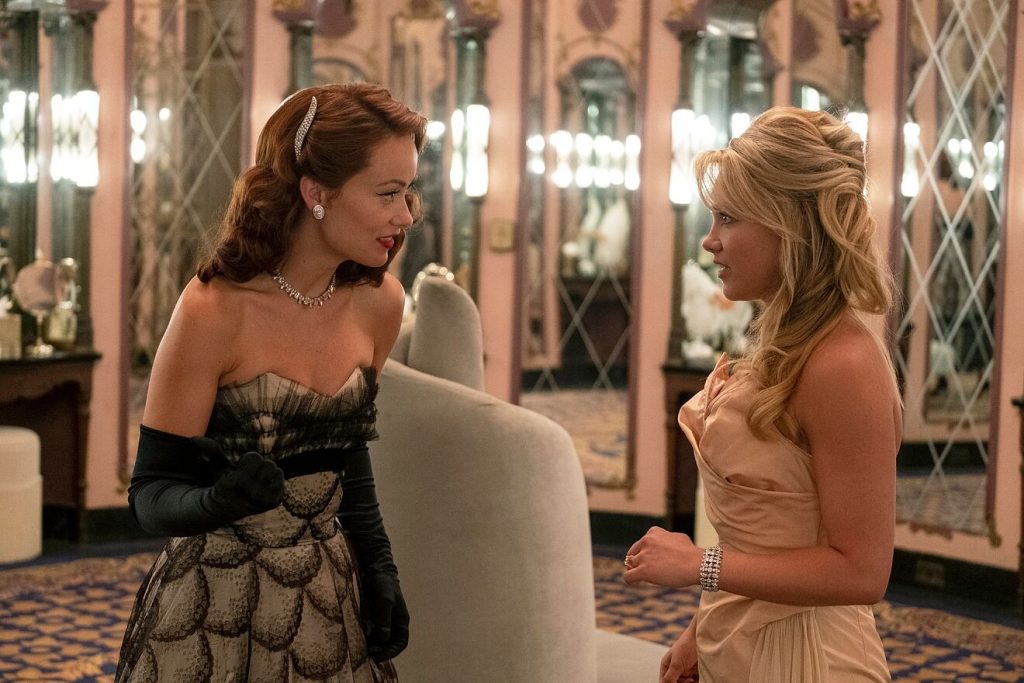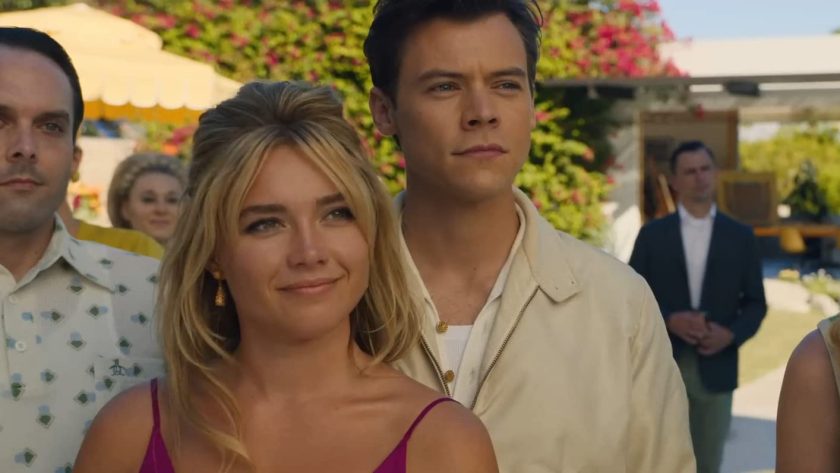Katelyn Liu reviews Olivia Wilde’s newest psychological thriller, starring Florence Pugh, Harry Styles, and Chris Pine.
DON’T WORRY EVERYONE, IT’S ACTUALLY ONLY KINDA BAD.
*This review contains thinly veiled spoilers, much like the movie itself and its attempt at covering up the BTS drama*
Olivia Wilde’s Don’t Worry Darling is the newest addition to the sun-kissed, pastel-convertible-driven American Dream saga: the classic utopia of nuclear familyhood set in the 1950s, featuring a heroine who tires of her domesticity. It’s The Stepford Wives in a world of Jordan Peterson, shrouded in TikTok and tabloid scandals centring the production of the film, with a star-studded cast fronted by Florence Pugh, Harry Styles, Chris Pine, and Wilde herself. It’s quite possibly the most discussed film of the year but, despite the unintended hype surrounding the movie, Wilde’s sophomore film falls short of the potential the story, cast, and writing had in heralding in a new era of feminist cinema.

Alice Chambers (Pugh) is happily married to up-and-coming Victory “technician” Jack Chambers (Styles). Victory, the sheltered, picturesque desert community in the latest “doomsday” plot, is the brainchild of the hauntingly charismatic Frank (Pine), with the effortlessly elegant Shelley (Gemma Chan) by his side (albeit, slightly The people in the neighborhood are like clockwork: the men pull out of their identical driveways with their gorgeous wives and children waving them off at the exact same time everyday; the women lounge by the pool discussing their family planning and shopping, go to ballet classes and housekeep, and have dinner prepared to be (ungratefully) tossed onto the floor in a fit of passion once their husbands return from work.
Alice begins to hallucinate via nightmarish scenes in the same vein as the thrillers Suspiria and Black Mirror (the series), and the walls of her house literally closing in on her. A fellow housewife, Margaret (Kiki Layne), returns to Victory terrorized and traumatized after a brief rehabilitation period following her attempt at venturing into the desert with her now-missing son. In her wake, a weary Alice rejects Margaret, fearing that she will lose status among the Victory housewives but ventures into the desert alone (poodle-skirt and black flat-clad which further adds to my admiration for Pugh’s character) after a plane crashes from overhead. While confiding in her husband later that night, Alice is gaslighted by Jack as he reminds her of his “duty” to “protect” the world, despite not knowing what Victory’s plan really is.

Alice’s suspicions continue to grow after she witnesses Margaret’s “accident”, immediately covered up by returning henchmen in red utility jumpsuit, and finds that all records of her have been erased. It’s not really clear what happens between here and the “big reveal”, but it’s assumed that Alice pieces together her real purpose in Victory when she directly confronts Frank and her husband’s colleagues after his promotion in the organisation. Following flashbacks that feature excellent transitions from the “present” day, she attempts to escape Victory and incites a feminist rebellion that’s simultaneously realised by all of her neighbours whilst they watch her escape. An epic pastel convertible car-chase ensues with Pugh leading which is, in my opinion, one of the greatest action sequences featuring a female protagonist, as the film comes to a close, during which you are finally able to breathe again.
While the plot is intriguing as a concept, the execution of a powerful narrative left much to be desired with its spotty pacing and inconsistent character development. It overexposes the obvious but quickly brushes over the rest of the resolution in an effort to cover up many of the plot holes and underdeveloped motives. How did the people of Victory get there? What stops them from leaving? What happened to the plane? Why Alice? So on and so forth. It’s not really as bad as I thought it would be, but most definitely an aesthetically pleasing experience.

Pugh’s incredible acting builds tension throughout the movie but is undermined by the one-dimensionality of both her’s and others’ characters and their relationships, resulting in an unsound conclusion as we leave the world of Victory behind. Jack and Alice are horny young adults with “real jobs” but the dynamic and workings of their relationship feel shallow right up to the end. It’s clear that Frank is a parody of Jordan Peterson, as Wilde was sure to mention on Elle, but that’s really all he is. Shelley is Frank’s docile and devoted Asian housewife and, while played by one of the most elegant and timeless actresses of our time, is reduced to little more than the “Lotus Blossom” stereotype. Margaret is the “crazed” Black martyr, the first to die, and the first to be ostracized from Victory’s inner circle. The movie, unfortunately, seems to only include this diversity to fulfill the “Oscar Requirement”, so Wilde’s lack of character development makes sense in the context of the film. It edges on (cheeky innuendo) a “white woman’s Get Out”, as many of the reviews have described, further revealing Wilde’s oversimplification of the difficult themes included in the story and whittling down of intersectional characters to typical Hollywood tropes. For a film set in the 1950s, the direction is authentic in matching the outdated characterizations of the time.
Alice and Bunny (Wilde) are fleshed out as the movie progresses, but it’s not enough to justify the film’s inclusion in the canon of feminist filmography, since their character arcs are neither resolved or challenged. Wilde has riffed off of many of her co-stars’ comments about the longstanding history of sexism within the industry, yet does little but reinvent the wheel of empowering female narratives.
The subject matter of the film is undoubtedly difficult to depict, but its marketing as a empowering “feminist” picture that “aims to flip the script on how female pleasure is represented in films” is greatly overshadowed by Wilde’s blatant overlooking of the true nature of the relationships throughout the film. The climax (the *other* Harry Styles one) literally revolves around the idea of control and bodily autonomy, both of which are abused and violated as the plot unravels towards the final act of the movie. It’s incredibly ironic, especially considering how hard Wilde has been pushing this film to be lauded for doing the bare minimum and still being b(eaten out) by more progressive movies predating Don’t Worry Darling by decades.

It would, of course, be an injustice not to mention the lush cinematography of the film. The colors, costumes, and sheer vibes of the movie are immaculate and portray the monotony of daily life for the women in Victory, as well as in the real world. The story unfolds through stunning vignettes into the inner workings of Alice’s brain and history, as well as building suspense and tension through eerie music, even during tasks as mundane as making breakfast and cleaning windows. If it weren’t for the fact that this film is as controversial and problematic as it is, I’d be booking myself a one way ticket to Victory just to immerse myself in the aesthetic of this film. Even against Matthew Libatique’s masterfully shot sequences, the film’s lack of emotional and narrative substance fails to create a coherent or enlightening experience.
It appears we won’t be able to avoid talking about this movie anytime soon. There are new developments everyday that avid TikTok conspirators are piecing together in order to understand what went wrong with a movie that showed so much promise. Above all, it’s truly admirable how much work these internet sensationalists are putting in to uncover production drama. If you’re looking for a movie for vibes and views, I couldn’t recommend this movie more. But for a story that will have you on the edge of your seat and insatiable for its resolution, Don’t Worry Darling is no match for the drama behind, rather than on, the screen.
Don’t Worry Darling is currently showing in cinemas and available to stream. Watch the trailer here:




